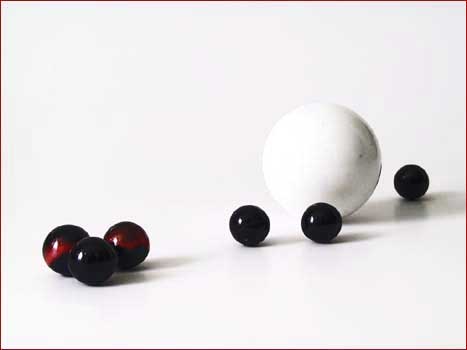| The Art of Giving Notice |
| General note: The following is a typical example of a translation of a text that is essentially unfit for translation due to its generous use of play on words. For example, what we call "black magic" in English is a translation of the Dutch expression "zwarte kunst", with "kunst" also translating into "art". Suffice it to say that the author and the translator had a whale of a time discussing what is and is not possible, linguistically speaking. |

| My daughter's dream emporium is destined to remain largely out of bounds to me, while wondrous gems have a way of popping up in her vocabulary, too. It doesn't do to insist on being provided with an explanation, as this inevitably sparks a confidentiality mechanism of kinds. Objects have neutral status up to a point, and when I asked her after the name of the small black marble she retrieved out of the sack of marbles she had been given to celebrate her earning her Advanced Swimmers' certificate, she replied: "Black Magic". The next marble she got out was a huge white one. What about that one then? "White Magic". |
|
It has happened to me more than once that someone approached me for an interview, an opinion, or a contribution to a radio or TV show, more often than not on the theme of money and investment, and more often than not with questions that proved anchored in some assumption or other. More often than not my replies failed to live up to expectations, and I ended up being thanked for my cooperation without my statements being used. It didn't matter one iota whether reality was different, for reality had already been established. Even if you really wanted to know the nitty-gritty, I'll stick to what my memory is capable of reproducing, for it isn't important enough for me to search for details. A long time ago a friend of an exhibitor who worked as a journalist for "Elseviers Weekblad", a weekly magazine, wrote a positive article about the gallery. As this was back in the years when realism was truly off-limits, her article, not surprisingly, never made it into print. Some ten years ago or so, when Sonja was still flying solo*, the statue of Wim & Corrie**, or possibly that of Johnny Jordaan***, once more surfaced as the topic of fierce debate. I was phoned up and asked how I felt about it, my answer being that I didn't much care as the statue clearly made thousands of citizens happy. Too bad, as this wasn't the opinion they were after, and so my contribution was never aired. A year or two ago there were advanced plans to involve me in a show ("The Mornings", I seem to recall) by the AVRO public broadcasting station. During the preliminary telephone conversations my views of the art market, investment and other matters were shown not to concur with those of the editors, with the predictable end result that they managed just in time to ditch me. Can you imagine that it was with decidedly mixed feelings that I found myself reading the endlessly repeated sensation-seeking reports on money-laundering via purchases of works of art and antiques in the run-up to the introduction of the € that relentlessly kept popping up on the front page of the "Parool" newspaper, courtesy of the art editors? I am well aware of the scepticism of the somewhat more sophisticated Dutchman or woman, and so I know you'll agree with me that there is no apter way of unmasking this form of pubic hoodwinking than by sighing: "I wish". What I'm about to tell you will sound slightly masochistic, but I'm fortunate enough to know how my daughter would solve this predicament: whenever she twists her middle finger around and behind her index finger, what she says is the opposite of what she actually means. So when a fortnight ago the publication of an interview involving myself in NRC Handelsblad, another Dutch newspaper, didn't happen, I sat down to write the Weekly you are now reading, gleefully telling myself that I was hoping that it would fall through forever. I just know that my middle finger must have been twisted behind my index finger, for a week ago I noticed much to my delight that the interview had been placed. And although the art editors knew that a symposium had been held in Assen just the week before on the theme of the "It's Okay Once More Mania"****, which - life being full of discrepancies - was participated in, inter alia, by Eric Bos (the illustrious journalist we met in Weekly no. 74, "Being It 1", and dazzling practitioner of senseless verbal violence), it was the economic editors who ended up stealing their thunder. I'm sure you must have seen my concluding sentence coming. Do you reckon the art editors are not aware that you can't play the game when you've lost your marbles? * Sonja Barend, a TV journalist whose talk shows were much "de rigueur" for some three decades, although she appears now to be more or less being put out to pasture (having been unsuccessfully teamed up with a co-anchor). ** Wim Kan, the Netherlands' first-ever stand-up comedian in the days when they were still referred to as "conférenciers", and his remarkably tiny wife, Corrie Vonk, who although she couldn't sing or dance and wasn't particularly funny was always a firm fixture of his shows. *** The uncrowned king of the tear-jerkers, Amsterdam style (with an accent to boot). **** Realism as a school of painting having been decidedly "not okay" for most of the past quarter century or thereabouts, it would appear that it's now okay once more to take it seriously, even admit openly to appreciating it. (See e.g. Weekly no. 80.) |